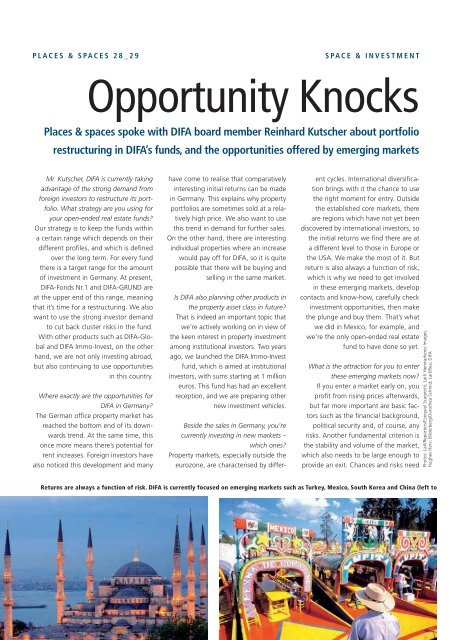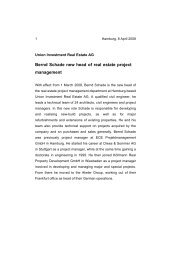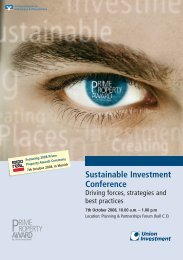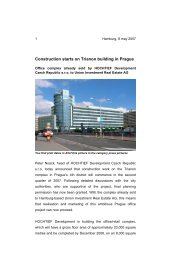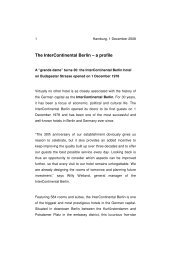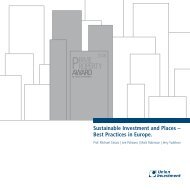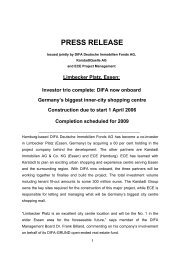BREAKTHROUGH IN THE CITY Why London's ... - Union Investment
BREAKTHROUGH IN THE CITY Why London's ... - Union Investment
BREAKTHROUGH IN THE CITY Why London's ... - Union Investment
You also want an ePaper? Increase the reach of your titles
YUMPU automatically turns print PDFs into web optimized ePapers that Google loves.
PLACES & SPACES 28_29 SPACE & <strong>IN</strong>VESTMENT<br />
Opportunity Knocks<br />
Places & spaces spoke with DIFA board member Reinhard Kutscher about portfolio<br />
restructuring in DIFA’s funds, and the opportunities offered by emerging markets<br />
Mr. Kutscher, DIFA is currently taking<br />
advantage of the strong demand from<br />
foreign investors to restructure its portfolio.<br />
What strategy are you using for<br />
your open-ended real estate funds?<br />
Our strategy is to keep the funds within<br />
a certain range which depends on their<br />
different profiles, and which is defined<br />
over the long term. For every fund<br />
there is a target range for the amount<br />
of investment in Germany. At present,<br />
DIFA-Fonds Nr.1 and DIFA-GRUND are<br />
at the upper end of this range, meaning<br />
that it’s time for a restructuring. We also<br />
want to use the strong investor demand<br />
to cut back cluster risks in the fund.<br />
With other products such as DIFA-Global<br />
and DIFA Immo-Invest, on the other<br />
hand, we are not only investing abroad,<br />
but also continuing to use opportunities<br />
in this country.<br />
Where exactly are the opportunities for<br />
DIFA in Germany?<br />
The German office property market has<br />
reached the bottom end of its downwards<br />
trend. At the same time, this<br />
once more means there’s potential for<br />
rent increases. Foreign investors have<br />
also noticed this development and many<br />
have come to realise that comparatively<br />
interesting initial returns can be made<br />
in Germany. This explains why property<br />
portfolios are sometimes sold at a relatively<br />
high price. We also want to use<br />
this trend in demand for further sales.<br />
On the other hand, there are interesting<br />
individual properties where an increase<br />
would pay off for DIFA, so it is quite<br />
possible that there will be buying and<br />
selling in the same market.<br />
Is DIFA also planning other products in<br />
the property asset class in future?<br />
That is indeed an important topic that<br />
we’re actively working on in view of<br />
the keen interest in property investment<br />
among institutional investors. Two years<br />
ago, we launched the DIFA Immo-Invest<br />
fund, which is aimed at institutional<br />
investors, with sums starting at 1 million<br />
euros. This fund has had an excellent<br />
reception, and we are preparing other<br />
new investment vehicles.<br />
Beside the sales in Germany, you’re<br />
currently investing in new markets –<br />
which ones?<br />
Property markets, especially outside the<br />
eurozone, are characterised by differ-<br />
ent cycles. International diversification<br />
brings with it the chance to use<br />
the right moment for entry. Outside<br />
the established core markets, there<br />
are regions which have not yet been<br />
discovered by international investors, so<br />
the initial returns we find there are at<br />
a different level to those in Europe or<br />
the USA. We make the most of it. But<br />
return is also always a function of risk,<br />
which is why we need to get involved<br />
in these emerging markets, develop<br />
contacts and know-how, carefully check<br />
investment opportunities, then make<br />
the plunge and buy them. That’s what<br />
we did in Mexico, for example, and<br />
we’re the only open-ended real estate<br />
fund to have done so yet.<br />
What is the attraction for you to enter<br />
these emerging markets now?<br />
If you enter a market early on, you<br />
profit from rising prices afterwards,<br />
but far more important are basic factors<br />
such as the financial background,<br />
political security and, of course, any<br />
risks. Another fundamental criterion is<br />
the stability and volume of the market,<br />
which also needs to be large enough to<br />
provide an exit. Chances and risks need<br />
Returns are always a function of risk. DIFA is currently focused on emerging markets such as Turkey, Mexico, South Korea and China (left to<br />
Photos: Laif/Reporters/Ezequiel Scagnetti; Laif/ Hemispheres Images<br />
Hughes Herv; Bilderberg/Dorothea Schmid; Laif/Rea; DIFA


